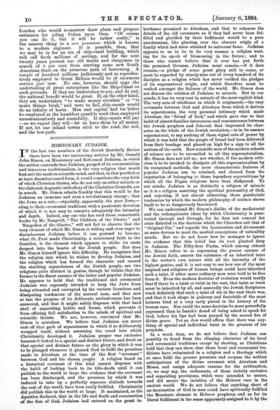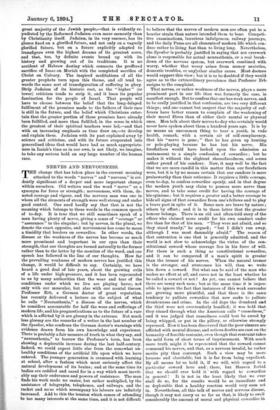MISSIONARY JUDAISM.
IN the last two numbers of the Jewish Quarterly Review there have been two interesting articles by Mr. Oswald John Simon, on Missionary and Reformed Judaism, in which the author contends that Judaism, purged of its ceremonialism and tenacious traditionalism, is the very religion that would best suit the modern scientific mind, and that, in that purified or at least disembarrassed form, it would constitute the very faith of which Christian theists, who do not rely on either miracle or the elaborate dogmatic orthodoxy of the Christian Councils, are in search. Mr. Simon admits frankly that this would be for Judaism an immense and even a revolutionary change ; that the Jews, as a rule,—especially, apparently, the poor Jews,— cling to their ceremonial traditions with a passionate devotion of which it is not easy to conceive adequately the intensity and depth. Indeed, any one who has read those remarkable books by Mr. Zangwill, " The Children of the Ghetto and Tragedies of the Ghetto," will not fail to observe that the very element of which Mr. Simon is willing and even eager to disembarrass Judaism before it can pretend to become, what St. Paul made Christianity, a missionary faith to the Gentiles, is the element which appears to strike its roots deepest into the hearts of the Jewish people. Nor does Mr. Simon himself ignore this difficulty. He recognises that the religion into which he wishes to develop Judaism, and the religion which has formed the character and caused the startling separateness of the Jewish people, are two religions quite distinct in genius, though he thinks that the former is the finest essence of the latter and popular Judaism. He appears to hold that the traditional and ceremonial Judaism was expressly intended to keep the Jews from being attracted and corrupted by the various licentious and dissipating tendencies of the natural man, and that now at last the purpose of its deliberate exclusiveness has been answered, and that it might safely dispense with that hard shell of separating habits and forms, which prevents it from offering full satisfaction to the minds of spiritual and scientific theists. We are, however, convinced that Mr. Simon is mistaken. We believe that Judaism can never cast off that garb of separateness in which it so deliberately wrapped itself, without assuming the creed into which Christianity developed it. Judaism proper was exclusive because it looked to a special and distinct future, and dwelt on that special and distinct future as the glory in which it was to be plunged whenever it pleased God to fulfil the promises made to Abraham at the time of the first " covenant " between God and his chosen people. A religion based on a historical covenant of this kind cannot dispense with the habit of looking back to its title-deeds until it can publish to the world at large the evidence that the covenant has been discharged, and the promises by which it was induced to take up a perfectly separate attitude towards the rest of the world, have been really fulfilled. Christianity did publish this to the world at large. It maintained, as the Apostles declared, that in the life and death and resurrection of the Son of God, Judaism had entered on the great in-
heritance promised to Abraham, and that to rehearse the details of the old covenants as if they had never been ful- filled and glorified by their fulfilment would be a pure anachronism, like gloating over the obscure origin of a family which had since attained to universal fame. Judaism appears to us to be in its very essence a religion wait- ing for its epoch of blossoming in the future; and to those who cannot believe that it ever has put forth the promised blossom, Judaism must remain,—if it does remain,—a pledge of some great glory still to come, or must be regarded by ninety-nine out of every hundred of its disciples as a religion which has never verified the pledges of its supernatural origin, and which therefore most be ranked amongst the failures of the world. Mr. Simon does not discuss the relation of Judaism to miracle. But to our minds, it has its very root in miracle of the most explicit kind. The very acts of obedience in which it originated,—the very covenants between God and Abraham from which it derives its separateness, the very personal intimacy which made Abraham the "friend of God," and which gave rise to that habit of almost familiar intercourse and remonstrance between the Jewish prophets and Jehovah that impressed its char- acter on the whole of the Jewish revelation,—is in its essence supernatural, to say nothing of those signal acts of power by which it was held that the people of Israel had been delivered from their bondage and placed on high for a sign to all the nations of the earth. How scientific men of the modern schools of science are to be reconciled to all this supernaturalism, Mr. Simon does not tell us ; nor whether, if the modern criti- cism is to be invoked to dissipate all this supernaturalism by its recognised methods, the most characteristic features of popular Judaism can be retained, and cleared from the imputation of belonging to those legendary superstitions by which all the Pagan religions have been disfigured. To our minds, Judaism is as distinctly a religion of miracle as it is a religion asserting the spiritual personality of God, and rejecting, if not almost abhorring, those pantheistic tendencies by which the modern philosophy of science shows itself to be so dangerously fascinated.
We can understand Mr. Simon's dislike of the mediatorial and the redemptionist ideas by which Christianity is pene- trated through and through, for he does not conceal his utter disbelief in the doctrine which the Churches call that of " Original Sin," and regards the Incarnation and Atonement as mere devices to meet the morbid conceptions of unhealthy minds. But we do not know how he manages to ignore the evidence that this belief has its root planted deep in Judaism. The Fifty-first Psalm, which (among others) Mr. Simon refers to as expressing the purest essence of the Jewish faith, asserts the existence of an inherited taint in the writer's own nature with all the intensity of the highest genius, and it is not easy to see how one of the most inspired and religious of human beings could have inherited such a taint, if other more ordinary men were held to be free from it. Even the modern doctrine of evolution would testify that if there be a taint or twist in the root, that taint or twist must be inherited by all, and assuredly the Jewish Scriptures teach definitely that such a taint of sin in the root there was, and that it took shape in jealousy and fratricide of the most heinous kind at a very early period in the history of the human race. Nor could the same doctrine be more powerfully expressed than in Isaiah's dread of being asked to speak for God, before his lips had been purged by the sacred fire of divine grace. Yet no Jew would affirm that there was any- thing of special and individual taint in the greatest of his prophets.
In a word, then, we do not believe that Judaism can possibly be freed from the clinging character of its local and ceremonial traditions except by showing, as Christians hold that they can show, that those local and ceremonial tra- ditions have culminated in a religion and a theology which at once fulfil the greater promises and surpass the noblest anticipations of the divine covenant with Abraham and Moses, and assign adequate reasons for the sublimation, or, we may say, the euthanasia, of those strictly exclusive and separating provisions, which were intended to secure, and did secure the isolation of the Hebrew race in the ancient world. We do not believe that anything short of an incarnation of God in man could have spiritually fulfilled the Messianic element in Hebrew prophecy, and as for its literal fulfilment in the sense apparently assigned to it by the great majority of the Jewish people,—that is evidently re- pudiated by the Reformed Judaism even more earnestly than by Christianity itself. Judaism, in its very essence, has its glance fixed on a glorified future, and not only on a vaguely glorified future, but on a future explicitly adapted to transfigure even the highest dreams of its greatest seers, and that, too, by definite events bound up with its history and growing out of its traditions. It is no accident of Hebrew destiny which connects the proffered sacrifice of Isaac on Moriah with the completed sacrifice of Christ on Calvary. The inspired meditations of all the greater prophets turn upon this theme, and all tend to- wards the same sort of transfiguration of suffering in glory. Strip Judaism of its historic root, as the " higher " (or lower) criticism tends to strip it, and it loses its popular fascination for the people of Israel. That people will have to choose between the belief that the long-delayed fulfilment of the promises made to the fathers of their race is still in the future, and the belief which Christians enter- tain that the greater portion of those promises have already been fulfilled, and more than fulfilled, in the sense in which the greatest of their spiritual teachers were led,—and that with an increasing emphasis as time drew on,—to develop and explain them. Judaism with its past explained away by science and criticism, and with its future evaporated into generalised ideas that would have had as much appropriate- ness in Isaiah's time as in our own, is not likely, we imagine, to take any serious hold on any large number of the human race.











































 Previous page
Previous page